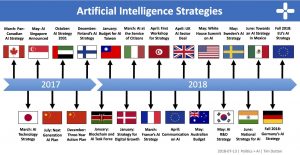A framework of a national strategy for the development of artificial intelligence was developed by scientists from BAS at the initiative of the President of the Academy, Academician Julian Revalski. The document is submitted for consideration to the Council of Ministers and is designed to support the development of a National Strategy for the Development of Artificial Intelligence (AI) in Bulgaria by 2030. The European Commission recommends that these strategies be integrated into a 10-year Action Plan.
We are facing an overall change in society that is far more than the technological revolution of the last century, scientists say. Technological innovations are not universally applicable and must be related to the national characteristics of the economy and the socio-cultural context.
Adapting and optimizing the interaction between technical and innovation processes and their impact on society could make a significant contribution to the competitiveness and productivity of the Bulgarian economy, the strategy notes. Cloud and internet technologies, the technologies for big data potential utilization, industrial and service robotics, artificial intelligence applications are the key technological prerequisites for developing digital economy.
The Framework of the National strategy for the development of artificial intelligence proposed by BAS also addresses social aspects by pointing out that the emergence of the new wave of “digital technologies” (machine self-learning, robotics, big data, autonomous systems) will have significant consequences for the economy and labor markets, with the potential to cause significant socio-economic changes.
The labor market and the new requirements for digital competence, change in learning and acquisition of qualifications as well as social significance are among the areas under consideration. It is natural to expect that when integrating AI technology into production and the public sector new jobs will emerge while other jobs will disappear. Studies show that there is no unanimous opinion as to whether this will lead to a decline or increase of employment. It is clear, however, that automation and digitization will change the types of jobs and types of skills that employees need.
Three specific areas for the introduction of AI in Bulgaria: health, AI for society (public services) as well as intelligent agriculture, livestock farming and environmental protection are considered as sectors – “consumers” of AI.
In the recommendations of the BAS working group for the sectors developing AI, there are several areas mentioned in which the country has good potential for development. One such example is the developing service robotics (eg intelligent assistants), robots for the use of micro and nano-technologies in biology, unmanned aerial vehicles with intelligent control, and so on. Another successful sector for Bulgaria is the development of software, including the use of AI for software development (and testing), man-machine interfaces in natural language with priority in the Bulgarian language, security systems, AI systems for industrial platform management, critical resources and infrastructures, etc.
The annex summarizes the existing Bulgarian legal acts related to the development of AI as well as the key normative acts at international / EU level.
The Working Group of BAS recommends the development of a National Strategy for the Development of AI in Bulgaria which includes the preparation of detailed socio-economic analyses on the benefits of the application of AI in different priority areas and the elaboration of a coordinated Action Plan with integrated measures in the different sectors.
The term Artificial Intelligence (AI) emerged in 1956 as a description of machines that mimic cognitive functions inherent in humans. The term “Artificial Intelligence”, used by the European Commission at present, covers systems that show intelligent behavior by analyzing their environment and, with some degree of autonomy, taking action to achieve specific goals.






